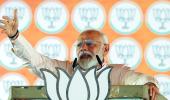Prime Minister Narendra Modi will win the 2024 general elections by the “largest majority” ever recorded in India's history, a prominent American executive and expert on India-US relations has said.

Ron Somers, founder and CEO of India First Group and the former President of leading business advocacy group US-India Business Council said that when Lok Sabha election results are declared on June 4, “I believe that Narendra Modi will win Parliament by the largest majority ever recorded in the country's history.
"That's a tribute to him -- to coalesce a country of 1.4 billion people, 970 million voters over a seven-phase electoral process and to have it be clean and completely legitimate, and no one doubting the veracity of the outcome.”
Addressing a special event ‘Developed India @ 2047' organised by the Consulate General of India in New York on Thursday, Somers said this demonstrates that India has gotten behind the idea that from former Prime Minister P V Narasimha Rao to Modi, the “policy of reform and getting India into the 2047” mode has been universal, there has been absolute unanimous support all along the way of how to get the country on that growth trajectory.
The event featured a special address by the Chairman of the Capacity Building Commission, Government of India, Adil Zainulbhai and a panel discussion.
Viksit Bharat, or Developed India by 2047, is the vision of Prime Minister Modi. Consul General Binaya Srikanta Pradhan told the gathering, which included eminent members of the Indian-American diaspora, US executives, policy experts and think tanks, that Developed India 2047, in the words of the Prime Minister, is a mission that demands not just ambition, but a multi-pronged strategy encompassing economic growth, robust governance reforms, transition to clean energy and scientific advancements.
“The roadmap would involve a whole-of-government approach, with wide ranging consultations and inputs from state governments, academia, industry, civil society and mobilisation of the youth of India,” Pradhan said.
Referring to the scale of the Indian elections, with 970 million people voting in a country of 1.4 billion, Somers said, “It really makes you wonder why we're not able to have an open and fair election here in the United States. It's really quite mind-boggling why we're having a challenge here when you can do it at that level in India.”
Somers added that one of the great legacies that will be left by India for 2047 is underway right now with the Indian electoral process that "we are all witnessing and keeping our eye on, 970 million people voting in a manner for their own pride, their own dignity, for the greatness of the future (of the) country.
"This is really quite extraordinary what's happening in India right now. And therefore, if there's a shining light, I hope that India can become the beacon of, as we go into the future decade …of democracy."
Pradhan added that the India-US partnership can be an important stakeholder in India's journey for the next 23 years. “It can help in this journey while becoming one of the major beneficiaries of this process. So it's going to be win-win for both India and the United States,” he said.
He underlined five areas in India-US collaboration which will contribute to the vision of developed India 2047 while benefiting both India and the United States. These include enhanced trade investment and deeper economic integration, collaboration on technology and innovation, education and skill development, healthcare and climate change and sustainability.
“The synergy between India's development goals and the US' key interests create a strong foundation for a mutually beneficial relationship, helping India to achieve its vision of becoming a developed nation by 2047 while benefiting the US in a major way,” Pradhan said.
Giving a detailed historical perspective of strengthening cooperation across sectors between India and the US during successive administrations in both countries, Somers said that today the United States and India are two of the largest defence partners in the world. “It's really blossomed into an extraordinary relationship,” he said.
Somers recalled the “dark day” of the 26/11 terror attacks in Mumbai carried out by Pakistan-based Lashkar-e-Taiba terrorists and said that apart from the horror of the attacks, “what happened that day was the intimate collaboration between US intelligence and Indian intelligence that had never ever happened before, where literally the United States and India were opening up channels of communications, listening to the orders being given from Pakistan, from the frontier to the terrorists in Mumbai.
"And at that point, there began to be a coalescing of partnership and trust between the US and India from the intelligence standpoint. It was really a dramatic moment. I would argue that the Pakistanis might have been jealous that India was progressing so beautifully at that point.”
Somers, who played a lead role in coordinating the passage of the India–United States Civil Nuclear Agreement in 2005, said it was the landmark US-India civil nuclear cooperation deal which deepened the bilateral partnership “overnight”.











 © 2025
© 2025